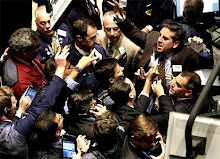MAY 14, 2009NEW YORK (Reuters) - Longtime technical analyst Robert Prechter, who forecast the 1987 stock market crash, predicted this week that U.S. equities may plunge to half their lows hit in March as a deflationary depression bites.
Oil and U.S. Treasury bonds are also locked in long term bear markets, while corporate bond prices will plunge precipitously by next year as broad economy, banking system and company earnings sustain more damage from a financial crisis that's akin to the Great Depression, he said.
The U.S. S&P 500 stock index's rebound by nearly 40 percent since it sagged to a 12-year closing low of 676 points on March 9 is not sustainable, Prechter said in an interview with Reuters.
"It's not the start of a new bull market," said Prechter, chief executive at research company Elliott Wave International in Gainesville, Georgia. "Our models are (showing) right now that it is a much bigger bear market than most people realize, something along the lines of 1929-1932," he told Reuters in a wide ranging interview. "It's a very rare event," he added.
"I think the next leg down will be at least as severe if not more severe than what we just experienced. So you want to stay on the side of safety," he said.
As in his 2002 book "Conquer the Crash," which warned of the dangers of a U.S. debt bubble and deflationary depression, Prechter continues to advocate safer cash proxies such as Treasury bills.
SEVEN MORE YEARS?
Riskier assets such as commodities, corporate bonds, and stocks which are currently anticipating that the severe global economic downturn may be bottoming, are likely to have short lived intense rallies, but within an inexorable long-term decline that may last another seven years, he said.
As banks continue to accumulate losses and corporate earnings fall, "the difficulties will probably last through about 2016," he said. "There will be plenty of rallies along the way."
Oil may rally further from current levels just below $60 per barrel but the upside will be capped at about $80 per barrel as the commodity is locked in a long-term bear market, he said.
In July, U.S. crude oil hit a record peak above $147 per barrel and was just above $57 per barrel around noon on Thursday.
"Deflation is coming, it's going to lead to a depression. We're not at the bottom yet," Prechter said. "I think we are going to have bouts of deflation separated by recoveries."
Prechter also painted a bleak picture for commodities like silver and is largely unenthusiastic about gold, believing the precious metal made a major peak when it rose above $1,000 last year.
While gold may have already topped at above $1,000 an ounce in March 2008, Treasury bond prices are likely to fall in a long term bear market, with huge government debt issuance being the main catalyst.
The benchmark U.S. 10-year Treasury note yield, which moves inversely to its price, hit a five-decade low of 2.04 percent in mid-December.
"People got very enamored with bonds and very enamored with gold and I don't like to be invested in markets that are over subscribed," Prechter said.
"The Treasury (Department) has taken on so much bad debt" at a time tax receipts are falling, that "there will be a slow, but very steady change in the way people will view the U.S. government," said Prechter. As a result, investors in Treasury notes and bonds will ultimately demand higher yields, he said.
The U.S. central bank will not be able to control the government bond market and prevent yields from rising, regardless of how much money the Fed uses to buy Treasuries, he added.
Next year, U.S. corporate bond prices will probably fall below their extreme price lows of December during the market panic of 2008 when investors fled riskier assets, he said.
"Corporates in terms of price have the big wave down coming. This has been a prequel," Prechter said.
"Many corporations who (now) say we can borrow more money and take more risks: those are the ones who will get in trouble," he said. "Many municipalities will default," he added.
Saturday, May 16, 2009
Subscribe to:
Comments (Atom)

